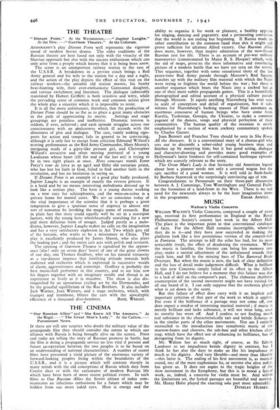MUSIC
Walton's Violin Concerto
WILLIAM WALTON'S Violin Concerto, composed a couple of years ago, received its first performance 'in England -at the Royal Philharmonic Society's concert last week in the Albert Hall. The place is the important point in that conventional catalogue of facts. For the Albert Hall remains incorrigible, whatever they do to it—and they have now succeeded in making the platform look like a less pretentious version of the concert-hall in Fantasia. The attempt to kill the echo has had, for its most noticeable result, the effect of deadening the resonance. When the music is familiar, the listener can bring his memory into play,-make a mental adjustment of the unbalanced sounds that reach him, and fill in the missing bars of The Bartered Bride Overture. But when the music is new, the lack of clear definition and the loss of detail make judgement difficult. What is brilliant in this new Concerto simply failed of its- effect in the Albert Hall, and I do not believe for a moment that this failure was due to a lack of skill on the composer's part. The elaborate rhythmic counterpoint of the second movement might not have existed for all one heard of it. I can only suppose that the orchestra played what is set down in the score.
But this failure of effect does carry with it an implicit and important criticism of that part of the work to which it applies. For even if the brilliance of a passage may not come off, one does expect a residue of interesting musical material ; if music is merely brilliant and lacks substance, it will not wear long, once its novelty has worn off. And I confess to not finding much real substance in th: characteristically tart and brittle Scherzo or in the similar parts of the other movements. Nor am I. entirely reconciled to the introduction into symphonic music of the marrow-bones and cleavers, the salt-box and other kitchen clap- trap, which have the effect not of enhancing its brilliance, but of derogating from its dignity.
Mr. Walton has as much right, of course, as Sir Edwin Landseer to set impudence beside dignity in contrast, but I think he has also the duty to make us like his impudence as much as his dignity. And very likeable—and more than likeable —this latter is. The ending of his first movement is, as musical sound, one of the most euphonious he, or anyone else alive today, has given us. It does not aspire to the tragic heights of the slow movement in the Symphony, but this is in mood a lyrical work, as, indeed, a concerto for violin- must be. And within the limitations set, the lyrical passages are beautiful and moving. Mr. Henry Hoist played the exacting solo part most admirably.
DYNELEY HUSSEY.






















 Previous page
Previous page